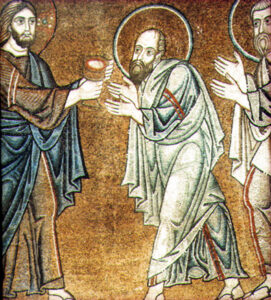| Put inward experiences to the test to see if they |
|---|
| come from God |
|---|
Ignatius
was passionately fond of reading worldly books of fiction and tales of
knight-errantry. When he felt he was getting better, he asked for some
of these books to pass the time. But no book of that sort could be found
in the house; instead they gave him a life of Christ and a collection
of the lives of saints written in Spanish.
By constantly reading these books he began to be
attracted to what he found narrated there. Sometimes in the midst of his
reading he would reflect on what he had read. Yet at other times he
would dwell on many of the things which he had been accustomed to dwell
on previously. But at this point our Lord came to his assistance,
insuring that these thoughts were followed by others which arose from
his current reading.
While reading the life of Christ our Lord or the lives
of the saints, he would reflect and reason with himself: “What if I
should do what Saint Francis or Saint Dominic did?” In this way he let
his mind dwell on many thoughts; they lasted a while until other things
took their place. Then those vain and worldly images would come into his
mind and remain a long time. This sequence of thoughts persisted with
him for a long time.
But there was a difference. When Ignatius reflected on
worldly thoughts, he felt intense pleasure; but when he gave them up
out of weariness, he felt dry and depressed. Yet when he thought of
living the rigorous sort of life he knew the saints had lived, he not
only experienced pleasure when he actually thought about it, but even
after he dismissed these thoughts, he still experienced great joy. Yet
he did not pay attention to this, nor did he appreciate it until one
day, in a moment of insight, he began to marvel at the difference. Then
he understood his experience: thoughts of one kind left him sad, the
others full of joy. And this was the first time he applied a process of
reasoning to his religious experience. Later on, when he began to
formulate his spiritual exercises, he used this experience as an
illustration to explain the doctrine he taught his disciples on the
discernment of spirits.

